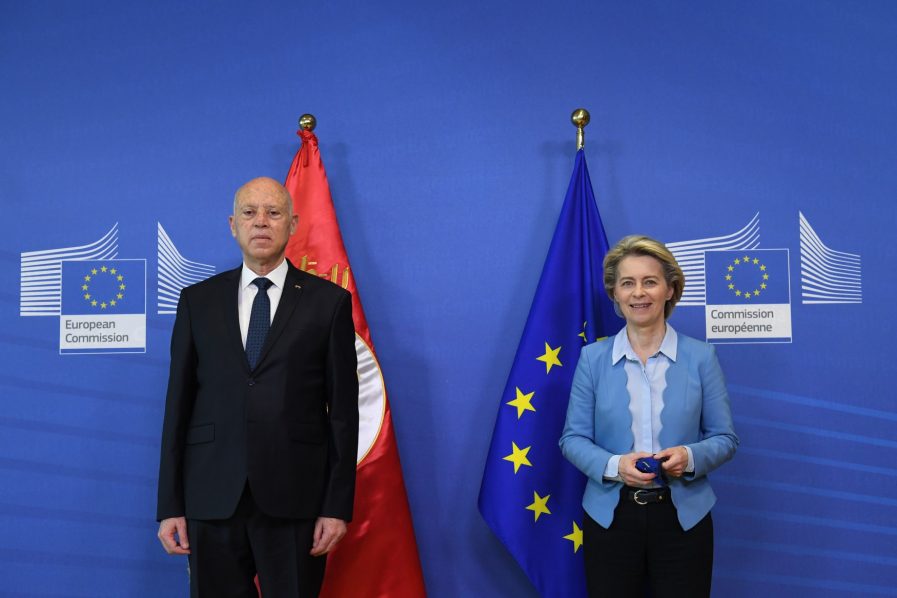EU’s externalization of migration policies and Tunisia’s democracy
Han Saerom(Sookmyung Women’s University)
In July of 2023, the European Union and Tunisia entered into a significant agreement, formally known as the “Memorandum of Understanding (MoU) on a strategic and global partnership,” which was announced to the public via a press release. This pivotal MoU spans a broad range of sectors, including but not limited to economic and trade relations, agricultural development, the advancement of digital infrastructure, and notably, an extensive focus on issues related to “migration and mobility.” Within this framework, the agreement lays out a series of commitments aimed at addressing “the root causes of irregular migration,” actively combating such migration flows, and importantly, establishing “legal migration channels” to provide more structured and humane migration options.
The agreement further delineates the European Union’s pledge to significantly enhance its financial support to Tunisia. This increase in funding is specifically earmarked for the provision of essential equipment, comprehensive training, and technical assistance, all aimed at bolstering the management of Tunisia’s border security. A critical point of emphasis within the document is the clarification that Tunisia is not to be perceived as a haven for irregular migrants and that the North African nation maintains exclusive control over its border security and management.
On the 13th of March, the European Parliament took a stance by adopting a resolution that openly criticized the European Commission’s decision to allocate €150 million to Tunisia through an expedited written procedure, a move that effectively circumvented the established channels of scrutiny typically required for such financial disbursements.
The resolution passed by the European Parliament strongly condemned what it described as a distressing decline in the standards of democracy, human rights, and the rule of law within Tunisia. It specifically pointed to the arbitrary arrests and detentions of opposition politicians, judges, media professionals, and civil society activists under the directive of President Kais Saied.
유럽연합의 이주문제 외주화와 튀니지의 민주주의
한새롬(숙명여자대학교)
2023년 7월, 유럽연합(EU)은 유럽연합과 튀니지 간의 “글로벌 전략적 파트너십에 관한 양해각서(MoU)”를 체결했다고 공식 발표한 바 있다. 이 양해각서는 경제 및 무역 관계, 농업과 디지털 인프라의 발전 등 다양한 분야에 대한 양측의 협력을 거론하는 동시에 특히 이주 관련 광범위한 협력에 관한 내용을 담고 있다. 예를 들어 양해각서는 “비정규 이민 문제의 근본 원인을 해결하기 위한” 일련의 약속을 포함, 이민 흐름에 적극적으로 대응하고, 무엇보다 더욱 체계적이고 인도주의적인 이민 정책을 제공하기 위한 “합법적 이민 경로”를 설정하는 것을 명시하고 있다.
또한 이 양해각서는 튀니지에 대한 유럽연합의 재정 지원을 상당 수준으로 증가시키겠다는 약속도 담고 있다. 튀니지의 국경 보안 관리를 강화하기 위한 필수 장비, 포괄적인 훈련 및 기술 지원을 위해 추가적인 재정지원이 필요하다는 것이다. 또한 유럽연합과 튀니지 간의 양해각서는 튀니지가 비정규 이민자들의 안식처로 인식되어서는 안되며 튀니지가 국경 보안 및 관리를 독점적으로 유지할 것을 지적하고 있다.
이러한 맥락에서 유럽위원회는 튀니지에 1억 5천만 유로를 지원하기로 결정했다. 문제는 이러한 유럽위원회의 결정이 표준화된 감시 채널을 우회한 긴급 서면 절차를 통해 이뤄졌다는 점이다. 2024년 3월 13일, 유럽의회는 유럽위원회의 결정을 공개적으로 비판하는 결의안을 채택했다.
유럽 의회가 통과시킨 결의안은 튀니지의 민주주의, 인권 및 법치의 기준이 심각하게 훼손되었으며 특히 카이스 사이드 대통령의 지시 하에 야당 정치인, 판사, 언론 전문가 및 시민 사회 활동가들이 구금되었다는 점을 지적했다. 이러한 지적은 유럽이 난민과 이주 문제를 해결하기 위해 독재자들에게 자금을 지원하고있다는 비난을 의식한 것으로 보여진다.

